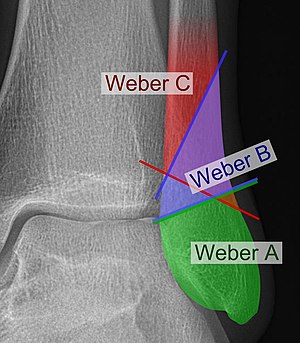Difference between revisions of "X-ray of ankle fractures"
Jump to navigation
Jump to search
(Started) |
(→Evaluation: Templated) |
||
| Line 14: | Line 14: | ||
[[File:Danis–Weber classification on X-ray.jpg|thumb]] | [[File:Danis–Weber classification on X-ray.jpg|thumb]] | ||
The ''Weber classification system'' applies to fractures of the distal fibula:<ref>{{cite book |last1=Mcrae |first1=Ronald |last2=Esser |first2=Max |title= Practical Fracture Treatment |edition= Fifth |isbn=978-0-443-06876-8 |page=382 }}</ref> | The ''Weber classification system'' applies to fractures of the distal fibula:<ref>{{cite book |last1=Mcrae |first1=Ronald |last2=Esser |first2=Max |title= Practical Fracture Treatment |edition= Fifth |isbn=978-0-443-06876-8 |page=382 }}</ref> | ||
| + | {{X-ray of fractures}} | ||
{{Bottom}} | {{Bottom}} | ||
Revision as of 19:12, 14 July 2019
Author:
Mikael Häggström [notes 1]
Contents
Planning
Choice of modality
In ankle trauma:
- X-ray of ankle fractures is generally the initial investigation of choice.
- CT of fractures can be used for a highly suspected complex fracture.
Evaluation
Ankle fractures commonly involve the malleoli. When applicable, classify as:
- Bimalleolar, when involving both the medial and lateral malleolus.
- Trimalleolar, when also involving the posterior process of the distal tibia.
Lateral malleolar fractures
The Weber classification system applies to fractures of the distal fibula:[1]
- For further information on evaluation and reporting on fractures in general, see X-ray of fractures
Notes
- ↑ For a full list of contributors, see article history. Creators of images are attributed at the image description pages, seen by clicking on the images. See Radlines:Authorship for details.
References
- ↑ Mcrae, Ronald; Esser, Max. Practical Fracture Treatment (Fifth ed.). p. 382. ISBN 978-0-443-06876-8.
